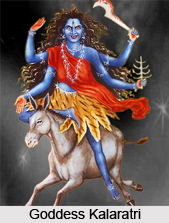 Goddess Kalaratri is the seventh form of Goddess Durga among the Nava Durga. The goddess is worshipped on the seventh day of Navaratri. The goddess is seen as one of the most fiercest and violent form of Godess Durga. Her terrible appearance itself evokes fear. Kalaratri is said to be the destroyer of all demonic creatures. The word Kalaratri means one who is `the Death of Kaal.` By worshipping the goddess one gets rid of ignorance and eliminates darkness. Kaal is designated as time and death. Though the goddess is very frightening she is also regarded as auspicious. She is thus also known as Subhankari i.e. one who is associated with positive things.
Goddess Kalaratri is the seventh form of Goddess Durga among the Nava Durga. The goddess is worshipped on the seventh day of Navaratri. The goddess is seen as one of the most fiercest and violent form of Godess Durga. Her terrible appearance itself evokes fear. Kalaratri is said to be the destroyer of all demonic creatures. The word Kalaratri means one who is `the Death of Kaal.` By worshipping the goddess one gets rid of ignorance and eliminates darkness. Kaal is designated as time and death. Though the goddess is very frightening she is also regarded as auspicious. She is thus also known as Subhankari i.e. one who is associated with positive things.
Legend of Goddess Kalaratri
According to a legend Goddess Kalaratri is said to have killed the demon Rakhtbeej. The demon had the power to multiply from every drop of blood that fell on the ground. The goddess sucked the blood before it fell on the ground thus, killing him.
Attributes of Goddess Kalaratri
Goddess Kalaratri is dark complexioned and has dishevelled hair. She has four hands and with two hands she holds a dagger and thorn like weapon while with the other two she displays abhaya mudra and varada mudra. The goddess is adorned with a necklace that flashes like lightening. She has three eyes that emanate rays and glows like lightening. Flames can be seen appearing while she inhales or exhales air through her nostrils. Her mount is a donkey.
Worship of Goddess Kalaratri
The worship of Goddess Kalaratri as prescribed in the scriptures is performed on the seventh day of Navaratri, also known as the `Night of Siddhis.` On this day the sages and worshippers perform penance on Shahtra Chakra. It is said that by worshipping the goddess all the sins of the devotees are completely destroyed. The following mantra is chanted while praying to the goddess.
Ek Vaidhi Japakrinpura Nagna Kharasthita |
Lamboshti Karnikakani Tailabhayashareerini ||
Vampadolallsallohaltaknatak Bhushana |
Vardhanmudhardhawaja Krishna Kalratribhayankari ||
This article is a stub. You can enrich by adding more information to it. Send your Write Up to content@indianetzone.com









